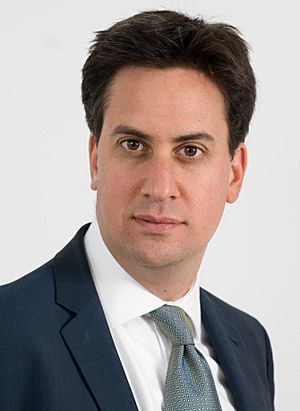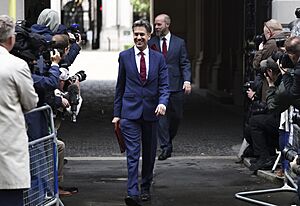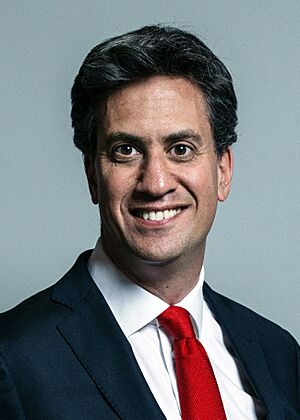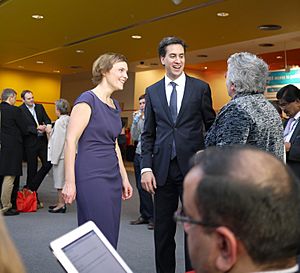Ed Miliband facts for kids
Quick facts for kids
Ed Miliband
|
|||||||||||||||||||||||||||||||||
|---|---|---|---|---|---|---|---|---|---|---|---|---|---|---|---|---|---|---|---|---|---|---|---|---|---|---|---|---|---|---|---|---|---|
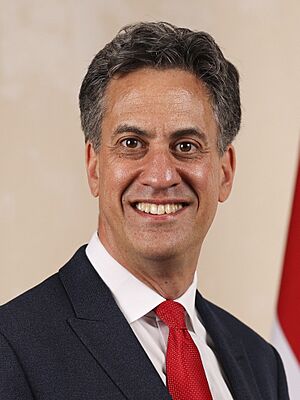
Official portrait, 2024
|
|||||||||||||||||||||||||||||||||
| Secretary of State for Energy Security and Net Zero | |||||||||||||||||||||||||||||||||
| Assumed office 5 July 2024 |
|||||||||||||||||||||||||||||||||
| Prime Minister | Keir Starmer | ||||||||||||||||||||||||||||||||
| Preceded by | Claire Coutinho | ||||||||||||||||||||||||||||||||
| In office 3 October 2008 – 11 May 2010 |
|||||||||||||||||||||||||||||||||
| Prime Minister | Gordon Brown | ||||||||||||||||||||||||||||||||
| Preceded by | Office established | ||||||||||||||||||||||||||||||||
| Succeeded by | Chris Huhne | ||||||||||||||||||||||||||||||||
| Leader of the Opposition | |||||||||||||||||||||||||||||||||
| In office 25 September 2010 – 8 May 2015 |
|||||||||||||||||||||||||||||||||
| Monarch | Elizabeth II | ||||||||||||||||||||||||||||||||
| Prime Minister | David Cameron | ||||||||||||||||||||||||||||||||
| Deputy | Harriet Harman | ||||||||||||||||||||||||||||||||
| Preceded by | Harriet Harman | ||||||||||||||||||||||||||||||||
| Succeeded by | Harriet Harman | ||||||||||||||||||||||||||||||||
| Leader of the Labour Party | |||||||||||||||||||||||||||||||||
| In office 25 September 2010 – 8 May 2015 |
|||||||||||||||||||||||||||||||||
| Deputy | Harriet Harman | ||||||||||||||||||||||||||||||||
| Preceded by | Gordon Brown | ||||||||||||||||||||||||||||||||
| Succeeded by | Jeremy Corbyn | ||||||||||||||||||||||||||||||||
|
|||||||||||||||||||||||||||||||||
|
|||||||||||||||||||||||||||||||||
| Member of Parliament for Doncaster North |
|||||||||||||||||||||||||||||||||
| Assumed office 5 May 2005 |
|||||||||||||||||||||||||||||||||
| Preceded by | Kevin Hughes | ||||||||||||||||||||||||||||||||
| Majority | 9,126 (29.4%) | ||||||||||||||||||||||||||||||||
| Personal details | |||||||||||||||||||||||||||||||||
| Born |
Edward Samuel Miliband
24 December 1969 London, England |
||||||||||||||||||||||||||||||||
| Political party | Labour | ||||||||||||||||||||||||||||||||
| Spouse |
Justine Thornton
(m. 2011) |
||||||||||||||||||||||||||||||||
| Children | 2 | ||||||||||||||||||||||||||||||||
| Parents | Ralph Miliband Marion Kozak |
||||||||||||||||||||||||||||||||
| Relatives | David Miliband (brother) | ||||||||||||||||||||||||||||||||
| Education | Corpus Christi College, Oxford (BA) London School of Economics (MSc) |
||||||||||||||||||||||||||||||||
| Signature | |||||||||||||||||||||||||||||||||
Edward Samuel Miliband (born 24 December 1969) is a British politician. Since July 2024, he has been the Secretary of State for Energy Security and Net Zero. He is also the Member of Parliament (MP) for Doncaster North, a role he has held since 2005. An MP represents the people of their local area, called a constituency, in the House of Commons.
From 2010 to 2015, Miliband was the Leader of the Labour Party and Leader of the Opposition. He and his older brother, David Miliband, both served in the Cabinet (a group of top government ministers) under Prime Minister Gordon Brown.
Before becoming an MP, Miliband worked as a television journalist and a researcher for the Labour Party. He also studied at Harvard University. After Labour won the 2024 general election, Prime Minister Keir Starmer appointed him to the Cabinet.
Contents
Early Life and Schooling
Ed Miliband was born in London on Christmas Eve, 1969. His parents, Ralph Miliband and Marion Kozak, were Polish Jewish immigrants. His father was a well-known writer and professor who had to flee from Belgium during the Second World War. His mother, a human rights activist, survived the Holocaust because she was protected by a Polish Catholic family.
When Ed was young, his family moved to Leeds, and he became a fan of the Leeds United football team. He also lived in Boston, Massachusetts, for two different periods. During his time in the United States, he became a fan of American culture and sports teams like the Boston Red Sox.
Miliband attended Haverstock Comprehensive School in London. As a teenager, he reviewed movies and plays for a radio show. After finishing his main school exams, he studied Philosophy, Politics and Economics at Corpus Christi College, Oxford. He later earned a Master of Science degree in Economics from the London School of Economics.
Start of His Political Career
After university, Miliband started working as a researcher for a TV show. In 1993, he began working for Harriet Harman, a senior Labour politician. He later worked for Gordon Brown, who was the Shadow Chancellor at the time. When Labour won the 1997 election, Brown became the Chancellor, and Miliband became one of his special advisers.
In 2002, Miliband took a break to be a visiting scholar at Harvard University in the United States. He taught economics and politics there. When he returned to the UK, he became the Chairman of the Treasury's Council of Economic Advisers, a very important job helping to plan the UK's economy.
Becoming a Member of Parliament
In 2005, Miliband decided to run for Parliament. He was chosen as the Labour candidate for Doncaster North, a safe seat for the party. He won the election on 5 May 2005 with a large majority.
In 2007, when Gordon Brown became Prime Minister, he made Miliband a member of his Cabinet. Ed and his brother David, who was the Foreign Secretary, became the first brothers to serve in the same Cabinet since 1938.
In 2008, Miliband was promoted to a new role: Secretary of State for Energy and Climate Change. He announced that the UK government would aim to cut greenhouse emissions by 80% by the year 2050. This was a big step in the fight against climate change.
Leader of the Labour Party
After Labour lost the 2010 general election, Gordon Brown resigned as party leader. Miliband decided to run in the election to replace him. His main opponent was his own brother, David Miliband. Other candidates included Ed Balls, Andy Burnham, and Diane Abbott.
The election was very close. On 25 September 2010, Ed Miliband was announced as the winner, beating his brother by a tiny margin. He became the new Leader of the Labour Party and Leader of the Opposition.
As leader, Miliband moved the party's policies in a more left-leaning direction. He introduced the "One Nation Labour" idea to show a change from the "New Labour" era of Tony Blair. He also changed the way the party elects its leader, giving every member an equal vote.
2015 General Election and Resignation
Miliband led Labour into the 2015 general election. Opinion polls suggested the result would be very close, but the Conservative Party won a clear victory. Labour lost many seats, especially in Scotland.
Following the disappointing result, Miliband announced his resignation as leader on 8 May 2015. He said it had been a "difficult and disappointing" night for the party. He returned to being a regular MP, known as a backbencher.
Return to the Frontbench
After stepping down as leader, Miliband continued to work as an MP. He spoke out on issues like inequality and climate change.
In April 2020, the new Labour leader, Keir Starmer, asked Miliband to return to the Shadow Cabinet. The Shadow Cabinet is a team of senior politicians from the main opposition party who "shadow" the government's ministers. Miliband became the Shadow Secretary of State for Business, Energy and Industrial Strategy.
In 2021, his role changed to focus specifically on climate change. He became the Shadow Secretary of State for Climate Change and Net Zero.
Return to Government

At the 2024 general election, Labour won a large victory. Prime Minister Keir Starmer appointed Miliband as the Secretary of State for Energy Security and Net Zero. This meant he was back in the Cabinet after 14 years.
One of his first actions was to lift a ban on building new onshore wind farms. This showed his commitment to increasing renewable energy in the UK.
Political Views
Miliband is generally seen as being on the "soft left" of the Labour Party. During his leadership campaign, he described himself as a socialist. He has called for "responsible capitalism," meaning that big companies should act fairly.
He has supported:
- A higher tax rate for the highest earners.
- A "living wage" to ensure people are paid enough to live on.
- Cutting university tuition fees.
- Stronger action on climate change, including a Green New Deal.
Miliband is a feminist and supported the law to allow same-sex marriage. He has also spoken about his Jewish heritage and his support for a safe Israel alongside a fair solution for Palestinians.
Personal Life
Miliband is married to Justine Thornton, who is a High Court Judge. They married in May 2011 and have two sons, Daniel and Samuel.
Miliband is of Jewish heritage but describes himself as a Jewish atheist. At his wedding, he followed the Jewish tradition of breaking a glass to honour his family's background.
He also co-hosts a popular podcast called Reasons to be Cheerful with radio presenter Geoff Lloyd.
Images for kids
Styles
- Mr. Edward Samuel Miliband (1969–2005)
- Mr. Edward Samuel Miliband MP (2005–2007)
- The Right Honourable Edward Samuel Miliband MP (2007–present)
See also
 In Spanish: Ed Miliband para niños
In Spanish: Ed Miliband para niños
 | Delilah Pierce |
 | Gordon Parks |
 | Augusta Savage |
 | Charles Ethan Porter |


